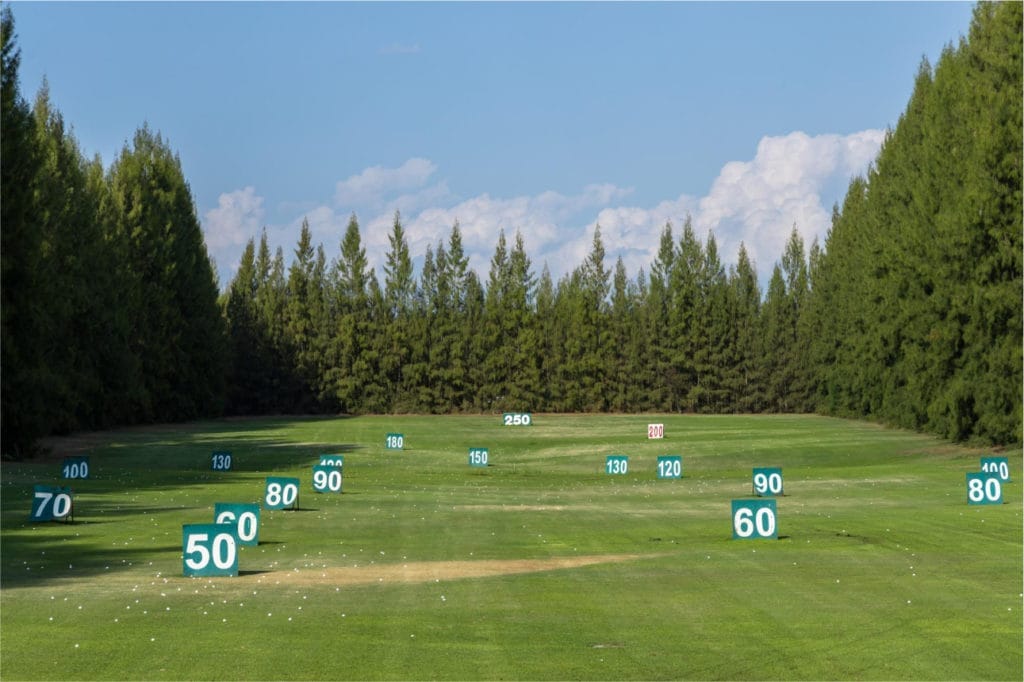If you’re an avid golfer or considering taking up the sport, you may wonder, “How long does a round of golf take?” Well, the answer isn’t as straightforward as you might think. Many factors can affect the duration of a round, from the skill level of the players to the course layout and even the pace of play.
In this blog post, we’ll explore what influences the time it takes to complete a round of golf and provide some tips on how to speed up your game if you’re short on time.
So, grab your clubs, and let’s tee off into the world of golfing time management!

How Long Does 18 Holes of Golf Take?
On average, a round of golf can take anywhere from four to five hours to complete for an average golfer. The duration can be influences by the time spent on each hole, walking or riding between holes, and any breaks taken along the way. This can be shortened by using a golf cart or following some time-saving tips.
How Long Does the Average Round Take on the PGA Tour?
On the PGA Tour, the average golf round typically takes four and a half to five hours to complete.
Fortunately, the players on the PGA Tour are highly skilled and experienced, which helps to maintain a steady flow of play. The organizers of the PGA Tour also work diligently to manage the pace of play and ensure that all players have a fair opportunity to showcase their abilities.
While it may vary from tournament to tournament, the average round of golf on the PGA Tour is carefully timed and structured to provide an enjoyable experience for players and spectators alike.
So, if you’re planning to attend a PGA Tour event, be prepared for a round of golf that is competitive and meticulously managed in terms of time.
How Long Does a Round of Golf Take at the Masters?
A round at the Masters takes around four to five hours to complete. This includes the time spent on each hole, any breaks or delays that may occur, and the overall flow of play throughout the tournament.
The Augusta National Golf Club organizers work diligently to keep things moving while allowing players to showcase their skills on the course. With strict rules and regulations in place, the Masters ensures that players adhere to a timely schedule without compromising the quality of play or the experience for spectators.
So, if you’re lucky enough to attend the Masters, be prepared for a round of golf that is exciting and well-managed in terms of time.
Understanding Different Formats and Their Time Requirements
Different golf formats have different time requirements, as each format presents unique challenges and strategies. Understanding the time requirements for different formats allows you to plan your round accordingly and save time on the course.
9-Hole Round
Playing a 9-hole round is a great option for those with limited time. It typically takes around 2-3 hours to complete, making it an ideal choice for those looking for a quick game on a busy day. Despite its shorter length, a 9-hole round can still provide an enjoyable and challenging experience for golfers of all skill levels.
Scramble Format
The scramble and shamble are popular golf tournament formats that involve teams of four players. This format is known for being fast-paced and fun, with rounds typically taking around 3-4 hours to complete.
Stroke Play Format
Stroke play is a popular format in golf where players play their own ball and count every shot. This method takes longer to complete, typically around 5-6 hours, as players take turns hitting their shots and moving around the course. Although it can be time-consuming, stroke play is considered the most traditional and fair way to determine a winner in golf tournaments.

Factors That Can Affect The Duration of a Round of Golf
Number of Players
Playing alone, with someone pregnant, or with just another person often leads to faster gameplay than larger groups. This is because fewer players mean less time spent waiting for turns and making decisions, resulting in a quicker pace of play.
However, playing with a larger group can also bring advantages, such as increased social interaction and more opportunities for strategic collaboration.
Skill Level of Players
Experienced golfers typically play faster and make decisions more quickly on the course than less experienced ones. This is because they better understand the game and the rules of golf, and can anticipate how their shots will affect their overall score.
On the other hand, less experienced players may take longer to make decisions and take more shots, which can extend the duration of a round.
Course Layout
Golf courses that feature longer distances between holes or more challenging terrain, such as water hazards or bunkers, can slow down the pace of play for longer hitters. This is particularly true for courses with fewer straight fairways and more doglegs, as golfers may take longer to strategize their shots.
Additionally, courses with multiple hazards like water or bunkers can cause players to take longer to decide and execute their shots carefully.
On the other hand, an empty golf course with shorter distances between holes or more straightforward terrain may result in faster rounds of play.
External Factors
If the weather is bad, such as during heavy rain or strong winds, it may take longer to complete each hole due to slower play and more challenging shots. Similarly, if the course has not been well-maintained, players may need extra time searching for lost balls or navigating difficult terrain.

Tips for Speeding Up Your Pace of Play
While several factors can influence the duration of a round of golf, there are also some tips that players can follow to help speed up their pace of play. Here are a few suggestions:
It is important for golfers of all levels, as outlined by the USGA, to be mindful of pace of play etiquette and keep up with the group in front of them to ensure an enjoyable experience for all players on the course.
Be Prepared
Before starting your round, ensuring you have all the necessary equipment is essential. This includes extra clean golf balls, tees, and any other gear that may be required, such as a golf glove or bag.
Having everything at hand eliminates the need to search for things during your game, which can be frustrating and time-consuming. Moreover, it will help you maintain your focus on the game and concentrate on improving your skills. So always double-check and know what to wear before setting out to play golf!
Be Efficient
Limit your practice swings to just one and keep your pre-shot routine brief to ensure you don’t waste time on the course. Practicing this can help you stay focused and ready to take the next shot, reducing the likelihood of mistakes. It also keeps the pace of play moving, which is essential when golfing with your playing partners.
Remember, efficiency in your approach, including keeping chat to a minimum while walking between greens and the clubhouse, can translate into better scores and a more enjoyable golf outing for everyone involved.
Keep Up with the Group in Front of You
Falling too far behind can affect not only your performance but also that of the entire team. However, before pushing yourself to go faster, it’s important to assess whether any underlying issues, such as inadequate training or physical limitations, may hinder your progress. Once you have identified the problem areas, you can work on improving them and ultimately improve your overall performance.
Be Mindful of Your Positioning
When playing a round of golf, it is important to park your cart or place your bag in a spot that allows for swift access to the next hole. This saves time and helps keep the pace of play moving smoothly. It’s best to choose a location close to the green of the previous hole or near the exit route from the green to the next tee box.
Additionally, be mindful of other players’ locations and avoid obstructing their path to the next hole, whether on the course or on the designated cart path.
Final Words
On average, a round of golf typically takes around four to five hours to complete, with tee time intervals between eight and twelve minutes. However, it’s important to note that this is just an estimate and actual playing time may vary.
If you’re planning to play a round of golf and are concerned about the time commitment, consider booking tee times during less busy periods or opting for shorter formats such as nine-hole rounds.
Ultimately, the most important thing is to enjoy your time on the course and savor every moment of this wonderful game.
